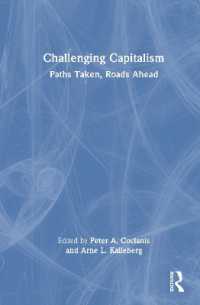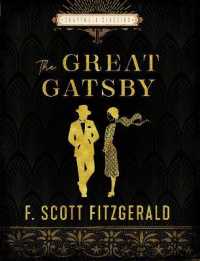- ホーム
- > 洋書
- > 英文書
- > Biography / Autobiography
Full Description
An abolitionist and a champion of free love and women's rights would seem decidedly out of place in nineteenth-century Texas, but such a man was Stephen Pearl Andrews (1812-1886), American reformer, civil rights proponent, pioneer in sociology, advocate of reformed spelling, lawyer, and eccentric philosopher. Since his life mirrored and often anticipated the various reform movements spawned not only in Texas but in the United States in the nineteenth century, this first biography of him sharply reflects and elucidates his times.
The extremely important role Andrews played in the abolition movement in this country has not heretofore been accorded him. After having witnessed slavery in Louisiana during the 1830s, Andrews came to Texas and began his career as an abolitionist with an audacious attempt to free the slaves there.
His singular career, however, comprised many more activities than abolitionism, and most have long been forgotten by historians. He introduced Pitman shorthand into the United States as a means of teaching the uneducated to read; his role in the community of Modern Times, Long Island, was as important as that of Josiah Warren, the "first American anarchist," although Andrews's participation in this communal venture, along with the significance of Modern Times itself, has been underestimated.
Other causes which Andrews supported included free love and the rights of women, dramatized by his journalistic debate with Horace Greeley and Henry James, Sr., and by his endorsement of Victoria Woodhull as the first woman candidate for the Presidency of the United States. These interests, together with his consequent involvement in the Beecher-Tilton Scandal, provide insight into some of the more colorful aspects of nineteenth-century American reform movements.
Andrews's attacks upon whatever infringed on individual freedom brought him into diverse arenas-economic, sociological, and philosophical. The philosophical system he developed included among its tenets the sovereignty of the individual, a science of society, a universal language (his Alwato long preceded Esperanto), the unity of the sciences, and a "Pantarchal United States of the World." His philosophy has never before been epitomized nor have its applications to later thought been considered.
"I have made it the business of my life to study social laws," Andrews wrote. "I see now a new age beginning to appear." This biography of the dynamic reformer examines those social laws and that still-unembodied new age. It reanimates a heretofore neglected American reformer and casts new light upon previously unexplored bypaths of nineteenth-century American social history. The biography is fully documented, based in part upon a corpus of unpublished material in the State Historical Society of Wisconsin.
Contents
Acknowledgments
Introduction by Louis Filler
I. New England Roots
II. Louisiana in Transition
III. Lone Star
IV. Don Quixote in London
V. Pothooks For Freedom
VI. Modern Times
VII. Brownstone Utopia
VIII. Mouthpiece of the Millennium
IX. The Court of the Pantarchy
X. "Protagonist of Humanity"
Notes
Works Cited
Index








